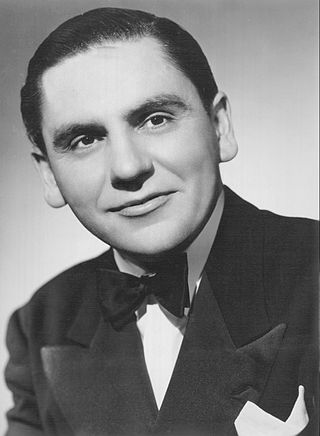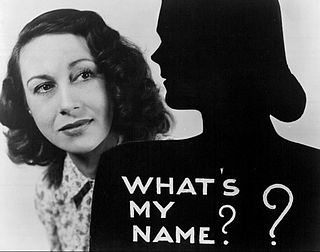The year 1941 in television involved some significant events. Below is a list of television-related events during 1941.

The $64,000 Question is an American game show broadcast in primetime on CBS-TV from 1955 to 1958, which became embroiled in the 1950s quiz show scandals. Contestants answered general knowledge questions, earning money which doubled as the questions became more difficult. The final question had a top prize of $64,000, hence the "$64,000 Question" in the show's title.
CBS Television Quiz is an American game show, running from July 2, 1941, to January 7, 1943, on the CBS television station in New York, WCBW Channel 2. It was the first game show to be broadcast regularly on television. It was an in-house production and broadcast in black-and-white. The host was Gil Fates, with Frances Buss as scorekeeper.

Truth or Consequences is an American game show originally hosted on NBC radio by Ralph Edwards (1940–57) and later on television by Edwards (1950–54), Jack Bailey (1954–56), Bob Barker (1956–75), Steve Dunne (1957–58), Bob Hilton (1977–78) and Larry Anderson (1987–88). The television show ran on CBS, NBC and also in syndication. The premise of the show was to mix the original quiz element of game shows with wacky stunts.
Information Please is an American radio quiz show, created by Dan Golenpaul, which aired on NBC from May 17, 1938, to April 22, 1951. The title was the contemporary phrase used to request from telephone operators what was then called "information" and later called "directory assistance".

The Blue Network was the on-air name of a now defunct American radio network, which broadcast from 1927 through 1945.

Quiz Kids is a radio and TV series originally broadcast in the 1940s and 1950s. Created by Chicago public relations and advertising man Louis G. Cowan, and originally sponsored by Alka-Seltzer, the series was first broadcast on NBC from Chicago, June 28, 1940, airing as a summer replacement show for Alec Templeton Time. It continued on radio for the next 13 years. On television, the show was seen on NBC and CBS from July 6, 1949, to July 5, 1953, with Joe Kelly as quizmaster, and again from January 12 to September 27, 1956, with Clifton Fadiman as host.
Break the Bank is an American quiz show which aired variously – and sometimes co-existed in separate radio and television forms – on Mutual Radio, ABC Radio and NBC Radio Network, as well ABC, CBS and NBC television, from 1945 to 1957. From October 1956 to January 1957, NBC aired a short-lived prime-time television version called Break the $250,000 Bank.

Beat the Band is a musical quiz show heard on NBC radio from 1940 to 1944 in two distinctly different series. The program popularized the show business catch phrase, "Give me a little traveling music", often uttered on TV a decade later by Jackie Gleason.

Breakfast in Hollywood is a morning radio show created and hosted by Tom Breneman broadcast from 1941 to 1948 on three different radio networks: NBC, ABC and Mutual. These unscripted shows were spontaneous and involved much audience participation. Breneman's many guests included such stars as Jimmy Durante, Andy Devine and Orson Welles.
Take It or Leave It is a radio quiz show, which ran from April 21, 1940, to July 27, 1947, on CBS. It switched to NBC radio in 1947, and on September 10, 1950, the name of the program was changed to The $64 Question.

Bob Hawk was an American radio quizmaster and comic whose early work in radio set the standard for the "man in the street” interviews.

Professor Quiz was radio's first true quiz program, broadcast with many different sponsors from 1936 to 1948 on CBS and ABC. The program featured Professor Quiz, his wife Betty, and his son, Professor Quiz Jr. The program's announcer was Robert Trout.

William Ernest Slater was an American military officer, educator, sports announcer, and radio/television personality from the 1920s through the 1950s, hosting the radio shows Twenty Questions and Luncheon at Sardi's. He was the great-uncle of actor Christian Slater.

What's My Name? was a 30-minute radio program in the United States. The program was hosted by Arlene Francis and was among the first radio shows to offer cash prizes to contestants.
Little Orphan Annie is an American radio drama series based on the popularity of the comic strip Little Orphan Annie. It debuted on Chicago's WGN in 1930, then moved to the NBC radio network Blue Network on April 6, 1931. It aired until April 26, 1942.
The Fred Allen Show was a long-running American radio comedy program starring comedian Fred Allen and his wife Portland Hoffa. Over the course of the program's 17-year run, it was sponsored by Linit Bath Soaps, Hellmann's, Ipana, Sal Hepatica, Texaco and Tenderleaf Tea. The program ended in 1949 under the sponsorship of the Ford Motor Company.

Kay Kyser's Kollege of Musical Knowledge is an American old-time radio musical quiz program starring Kay Kyser. It was broadcast on Mutual, NBC, and ABC beginning on February 1, 1938, and ending on July 29, 1949.
This Amazing America is an American old-time radio musical and quiz program that ran from February 16, 1940, to June 28, 1940, on NBC-Blue. A different program with the same title was broadcast later on NBC-Red.
This is a list of American television-related events in 1941.











